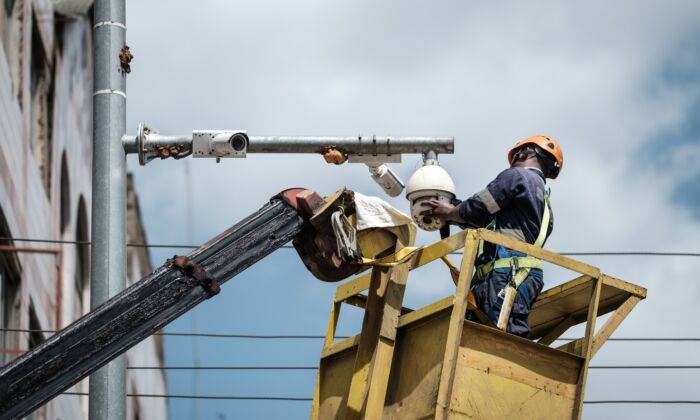China has been heavily promoting its surveillance technology among client governments around the world, but apart from miring the locals in debt and raising national security risks, the projects have produced lackluster results.
Multiple cities in Pakistan have reported increased crime rates, despite installing “safe city” infrastructure built by China’s state-linked tech company Huawei.
Completed in 2016 at a cost of around $100 million, the safe city project in Islamabad boasts 1,950 surveillance cameras. Seventy-two screens in the Pakistani capital’s police headquarters help officers monitor the streets.
Huawei claimed that the endeavor would dramatically improve order, with a projected 15 percent reduction in violent crime. But while crime did fall in 2016, by the end of 2018 it had increased by 33 percent in Islamabad.
Pakistan is a key country in the Belt and Road (BRI), the Chinese regime’s global infrastructure investment project. It has also been one of Beijing’s long-term allies.
Since 2015, Pakistan has engaged Huawei to build Safe City systems in nine cities.
Huawei claims that the safe city project can substantially improve emergency response time, crime rates, and case-solving. But data from the country’s National Police Bureau shows that the overall crime rate rose by 11 percent.
A Nov. 12 report by Bloomberg cited a Pakistani legislative committee as saying that half of the Huawei-produced cameras in Islamabad were out of order.
From 2017 to 2018, instances of dacoity, a term used on the Indian subcontinent to refer to banditry, rose by 244 percent, while robbery and burglary saw a 61.6 percent increase. Murders and kidnappings also became more frequent.
Police statistics showed that crime rose by 2.86 percent throughout Pakistan from 2017 to 2018, with the capital seeing the worse increases.
More Hype Than Results
Kenya, another country with heavy BRI investments, has also installed Huawei’s safe city system in its cities, including Mobassa and the capital, Nairobi.
According to Huawei, the projects helped crime rates in the cities drop by 46 percent year-on-year from 2014 to 2015.
But Kenya’s National Police Service reported different results. By their statistics, the crime rate in Nairobi experienced a slight decrease in 2015, but increased the following years, reaching a higher level than that prior to the safe city program’s introduction by 2017.
The same police report said that crime rates in Mombasa never went decreased following the installation, which also took place in 2014. Kenyan authorities have not commented on why the Huawei technology failed to work as advertised.
On Nov. 4, the Washington-based Center for Strategic & International Studies (CSIS) published a report saying that Huawei used exaggerated data to promote its safe city projects.
The report looked at data from Huawei safe city projects installed in 73 cities across 52 countries. Huawei itself claims that the infrastructure has been set up in 230 cities in 90 countries.
The report also questioned Huawei’s claims about the program’s success, noting that “all statistics are reported for an unspecified location and time period and no specific data or sources are provided for the numbers.”
Moreover, “after adopting Huawei’s equipment, countries may be ‘locked-in’ by high replacement costs,” the report said. This includes tech upgrades as well as replacement and repair of poorly built components.
Debt and National Security
The CSIS report warns that the Chinese regime may be “exporting authoritarianism” by repurposing “facial and license-plate recognition, social media monitoring, and other surveillance capabilities” associated with the programs.
And because most of the projects are part of the BRI plan, the clients are likely to be saddled with debts they cannot pay. There is currently no publicly available data that show how much debts are caused by Huawei. But most of the BRI countries with high debt risks use Huawei’s systems.
In 2018, the Washington-based Center for Global Development (CGD) published a report analyzing BRI-related debts.
The People’s Republic of China (PRC) envisions BRI as a project to span at least 68 countries and involve as much as $8 trillion in investments worldwide to build a vast network of transportation, energy, and telecommunications infrastructure primarily linking Europe, Africa, and Asia.
To build this network, Chinese regime lended funding to partner countries via the China Development Bank (CDB), the Export-Import Bank of China (China Exim Bank), and the Agricultural Development Bank of China (ADBC).
In order to qualify for the loans, the client states are required to use Chinese products.
The report integrated the countries’ overall public debt-to-GDP ratio and the concentration of that debt with China as the creditor, identified eight countries where BRI appears to create the potential for debt sustainability problems.
For example, Djibouti’s GDP was $1.73 billion in 2016, but it owes China $1.2 billion, more than half of its economy. The other seven at-risk countries are Pakistan, Laos, Mongolia, Kyrgyzstan, Tajikistan, Maldives, and Montenegro.
Kenya owns China $4 billion, and is among the other 15 countries that are significantly or highly vulnerable to debt distress because of their acceptance of BRI loans.
This article is from the Internet:Huawei ‘Safe Cities’ Are Ineffective, According to Crime Figures
9 People Who Allegedly Double Voted in 2018 Election Are Referred for Prosecution: Officials
